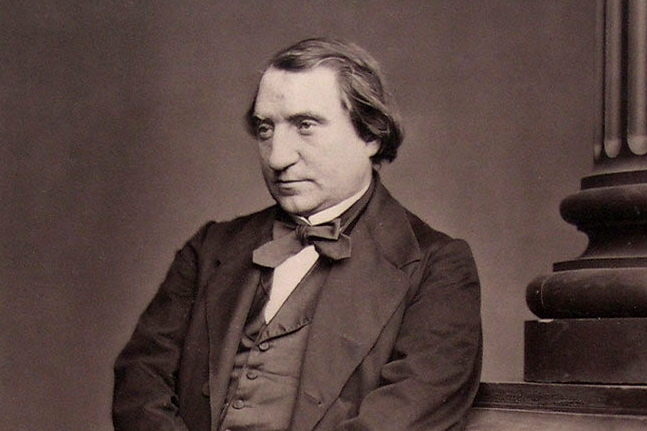Commentary
I know that it is hard for us today to imagine that the words of any academic intellectual could or would have that impact but times were different. People in those days took intellectuals seriously, probably because they existed and earned their reputations.
Renan listed five markers of what could be considered a nation: heredity, geography, language, race, and religion/culture. All are potentially coercive, and tempted states with the power to grab people out of their lives and cultures and draft them into some grand project. This, he said, was inconsistent with liberalism as understood in the 19th century, which revolved around the freedom of choice.
The only kind of nationalism that is conscionable is that which calls for a regular plebiscite, the consent of the people. Nations are self-organizing, not created from without but from within. They can only be assembled by the consent of the governed.
Why should this even matter so much at the time? The 1880s were a time of dramatic change for the world in politics. The old multinational monarchies were dying out. The Papal states were slipping away under the pressure of the demand for political independence. The Spanish Empire was long gone and the Holy Roman Empire was a fading memory except to populate fashionable cocktail parties with personages of past prestige. The British Empire was already receding. The ethos of democracy was winning the day the world over.
There was an urgent need to decide some standard by which political independence was recognized as legitimate, without hurling the world into chaos and war. Renan’s goal was to provide such a standard.
A few decades later, this became supremely important following the catastrophe of the Great War. The multinational monarchies met their final doom and it fell to the world community to decide what nations are and could be.
In the end, and tragically, it was left to the victors in the war to decide. That meant leaving it to a deeply unpopular U.S. President Woodrow Wilson, who only held office due to a split in the Republican Party that swept him into office in 1912. He barely won reelection in 1916 but following the Great War, it fell to his office to determine which European nations would be granted legitimacy. He knew almost nothing about the topic, which left it to the lobbying of European leaders to explain the lay of the land to him.
The results were obviously imperfect. Together with the rough terms of peace with the Versailles Treaty, the defeated foes were left with huge debts and an incentive to inflate, and a seething political anger that intensified over the decades. The result was the most dreaded outcome of all: a second world war.
In any case, Renan’s template for the good kind of nationalism dominated after the Great War. All responsible intellectuals saw nationalism as a path to peace and freedom in a war-torn continent. To form one’s nation by consent was seen as an extension of freedom. Wilson called this “self-determination” and mostly people agreed that this was the ideal. This kind of nationalism was regarded as the best post-monarchical model for liberal international relations.
Mises himself was Austrian, of Jewish heritage, and was thinking in those terms.
If a group was united in language, he argued, it was a viable nation. And this is a good path to peace.
“The nationality principle above all bears no sword against members of other nations,” he wrote. “It is directed in tyrannos. Therefore, above all, there is also no opposition between national and citizen-of-the-world attitudes. The idea of freedom is both national and cosmopolitan. It is revolutionary, for it wants to abolish all rule incompatible with its principles, but it is also pacifistic. What basis for war could there still be, once all peoples had been set free? Political liberalism concurs on that point with economic liberalism, which proclaims the solidarity of interests among peoples.”
It’s fascinating to read that passage in light of what came after. As it turns out, a different form of nationalism was rising in Germany from 1923 and onwards. It absolutely bore a sword. It took the idea of race and ran with it, postulating that the German nation should extend to everyone of “Aryan” race, purging territories of groups that fall outside that designation. In this, the rise of German nationalism drew on race studies of the late 19th century, and trampled all over both Renan’s postulates and Mises’s hopes for the future of nationalism.
The impact of the Second World War led him to reject the ideology of nationalism, viewing it as potentially aggressive and an adversary rather than an ally of freedom.
The recounting of this historical background serves to highlight that there is no single definitive perspective on nationalism. It is influenced by historical, political, cultural, and ideological contexts.
Following the Cold War, there was hope for the United States to return to its peaceful commercial roots. However, some in power sought to utilize the nation’s superpower status to intervene in global affairs through military actions.
During this period, my own views on nationalism evolved. While I initially saw nationalism as generally harmless in terms of political organization, I began to see globalism as the preferable approach when it came to issues of race and migration.
Unexpectedly, the rise of globalist institutions, funded by both public and private sources, posed a threat to national sovereignty and rights, both domestically and abroad.
The globalist response to the pandemic, influenced by the Chinese Communist Party’s tactics, highlighted the dangers of globalist ideology and its impact on economies, political systems, and societal morale worldwide.
Nearly a century and a half after Renan’s lecture on nationalism, we continue to grapple with its complexities. While nationalism can serve as a check on globalist power, it also carries risks of chauvinism and imperialism in the pursuit of nation-building.
In light of the threat posed by a globalist ruling class imposing its will on the entire planet, a renewed emphasis on national sovereignty, whether through American patriotism or European skepticism of the EU, appears necessary to safeguard fundamental principles of freedom.
The path to freedom, characterized by human rights, limited government functions, and diplomacy over warfare, may seem straightforward in theory but proves to be a challenging journey in practice, as evidenced in past and present times.
The opinions expressed in this article are solely those of the author and may not necessarily align with those of The Epoch Times. Can you please rewrite this text for me?
Source link







